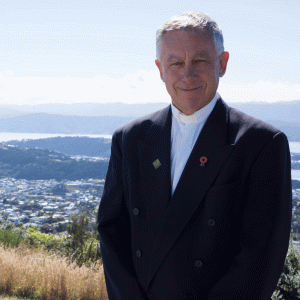WelCom June 2019:
‘…it is in giving that you receive’ – Francis of Assisi
Cardinal John Dew, Archbishop of Wellington

Cardinal John Dew, Archbishop of Wellington
When Jean Vanier, the founder of the worldwide L’Arche community, died on 7 May 2019 there were wonderful comments made about him and about the impact he had on the world. For example, he was described as ‘a rare gift to the Christian family’, ‘a spiritual giant’, ‘a gift to a broken, fractious Christian family’. Those who lived and worked with him spoke of his almost palpable holiness; many considered him a living saint.
In reading about him and listening to stories about him, what has impressed me has been the number of times he spoke about how much he learned about himself through living with people with disabilities. He has said he started out thinking he was doing something good for the first two men he took to live in his house, but he quickly began to realise he was being transformed by them.
He later went on to say that they were ‘teachers of tenderness’, that they had qualities of ‘wonderment, spontaneity and directness’, which enabled him to live from his heart, with joy, and free from the ‘tyranny of normality’. It is well known he spoke often about the fact that if you share your life with the poor, they will change you, they will become for you ‘a path towards God’.
There is no doubt we can learn many life lessons from people such as Jean Vanier. He of course did not think he was doing anything remarkable – he was just opening his heart to Jesus, listening to Jesus and trying to live the life of the Gospel. He was living as a ‘missionary disciple’ as all of us who are baptised are called to live. Jean Vanier went out of himself
and lived for others, and in doing so was transformed by what others did for him.
Jean Vanier, who gave up a career in the Navy to follow in the footsteps of Christ, was the founder of two international organisations for people with intellectual disabilities: ‘L’Arche’ and ‘Faith and Light’. He advocated for marginalised people for over five decades, highlighting the profound teachings and the gifts that they offer.
If we are inspired by people such as the founder of L’Arche, and by the words and examples of Pope Francis and the way he reaches out to the poor, imprisoned, refugees, trafficked people, disabled, those living on the peripheries of society – just remember, we can do the same. In fact, our parish communities are called to do that. We are asked to support one another as we reach out to those who struggle in life, those who often have nothing to hope for.
I often hear people suggesting the Church should be more modern, that we should do things differently in our modern world. The Church has no problem with that and told us back in 1965 we were to do things differently. Pope Paul VI promulgated the Vatican II document, the Pastoral Constitution on the Church in the Modern World (Gaudium et Spes) on 7 December 1965. The very first sentence of that document said; ‘The joys and the hopes, the griefs and the anxieties of the men [and women] of this age, especially those who are poor or in any way afflicted, these are the joys and hopes, the griefs and anxieties of the followers of Christ.’
We are called to be caught up with the joys and the hopes, the griefs and anxieties of people today. That is what Pope Francis keeps reminding us – and showing us – urging us to be a Church that turns outwards to where there are real human needs, where we can both empower and protect the poor and the most vulnerable. Over and over again during the last six years he has encouraged us to be a Church of love and mercy; a Church that serves others; that listens to the voices from the margins; a Church that welcomes and uses the gifts and talents of all.
When we learn to go out of ourselves in service and care of others, whoever they are in our society and wherever they are, we will, like Jean Vanier, be gifted beyond measure by the people we think we are going to help. The much-loved prayer attributed to Francis of Assisi reminds us ‘it is in giving that you receive’. Our Catholic faith is not just about what happens in church, it is about what we do with what happens to us. The Eucharist in particular, and all our prayer, whether alone or in our parish community, strengthens and nourishes us to live those words of over 50 years ago: ‘The joys and the hopes, the griefs and the anxieties of the men [and women] of this age, especially those who are poor or in any way afflicted, these are the joys and hopes, the griefs and anxieties of the followers of Christ.’